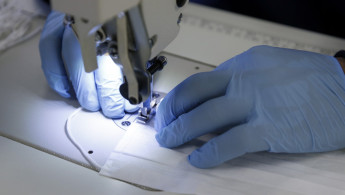Follow us on Facebook, Twitter and Instagram to stay connected
Istanbul engineers use 3D printers to make masks for doctors, nurses amid coronavirus pandemic
A group of engineers in Turkey have come together to make masks for healthcare professionals in an effort to help battle coronavirus.
2 min read
Turkey has mobilised to make face masks [Getty]
Engineers and designers in Istanbul are using 3D printers to generate hundreds of plastic face shields for use by Turkish healthcare workers during the new coronavirus pandemic.
At the Istanbul Technical University, 15 people - including five volunteers - work over twelve hours to make up to 400 visors daily.
Can Onart, an industrial designer, told the AP on Friday the reusable visors are currently being used in nearly 100 hospitals across Turkey.
"At the point of first contact with (infected) patients, healthcare workers need to wear a protective mask on top of the cloth mask.
"It (the 3D visor) protects them from whatever may splash in their face, like blood or spit,” said Onart.
“These masks are used because there's a strong possibility that the patient will spray blood while being intubated, when a tube is being placed in their lungs.
"One of the special characteristics of this mask compared to other masks is that it can be repeatedly disinfected and reused,” the 35-year-old added.
Healthcare workers submit orders through the lab's website and the finished products are produced and delivered at no cost to the healthcare workers.
Turkey has reported 356 deaths from the new coronavirus outbreak, and over 18,000 confirmed cases, with Istanbul becoming the "epicentre" of the outbreak.
For most people, the new coronavirus causes mild or moderate symptoms, such as fever and cough that clear up in two to three weeks.
"We mostly deliver [the masks] to healthcare workers,” Onart revealed, adding: “Right now we've sent them to 96 different hospitals in 23 cities (in Turkey.)
“We have repeat orders, requests and we deliver to new hospitals every day. We do prioritise and bring whoever needs them most to the front of the line and deliver to them first."
Read More: Coronavirus could kill 100,000 Syrians in Idlib's refugee camps
For some, especially older adults and people with existing health problems, it can cause more severe illness, including pneumonia, and could lead to death.
The vast majority of people recover.
Agencies contributed to this report.
At the Istanbul Technical University, 15 people - including five volunteers - work over twelve hours to make up to 400 visors daily.
Can Onart, an industrial designer, told the AP on Friday the reusable visors are currently being used in nearly 100 hospitals across Turkey.
"At the point of first contact with (infected) patients, healthcare workers need to wear a protective mask on top of the cloth mask.
"It (the 3D visor) protects them from whatever may splash in their face, like blood or spit,” said Onart.
“These masks are used because there's a strong possibility that the patient will spray blood while being intubated, when a tube is being placed in their lungs.
"One of the special characteristics of this mask compared to other masks is that it can be repeatedly disinfected and reused,” the 35-year-old added.
|
Healthcare workers submit orders through the lab's website and the finished products are produced and delivered at no cost to the healthcare workers.
Turkey has reported 356 deaths from the new coronavirus outbreak, and over 18,000 confirmed cases, with Istanbul becoming the "epicentre" of the outbreak.
For most people, the new coronavirus causes mild or moderate symptoms, such as fever and cough that clear up in two to three weeks.
"We mostly deliver [the masks] to healthcare workers,” Onart revealed, adding: “Right now we've sent them to 96 different hospitals in 23 cities (in Turkey.)
“We have repeat orders, requests and we deliver to new hospitals every day. We do prioritise and bring whoever needs them most to the front of the line and deliver to them first."
Read More: Coronavirus could kill 100,000 Syrians in Idlib's refugee camps
For some, especially older adults and people with existing health problems, it can cause more severe illness, including pneumonia, and could lead to death.
The vast majority of people recover.
Agencies contributed to this report.





 Follow the Middle East's top stories in English at The New Arab on Google News
Follow the Middle East's top stories in English at The New Arab on Google News

![Israeli forces ordered bombed Gaza's Jabalia, ordering residents to leave [Getty]](/sites/default/files/styles/image_330x185/public/2176418030.jpeg?h=a5f2f23a&itok=_YGZaP1z)
